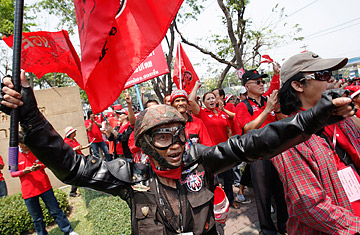
Supporters of ousted Prime Minister Thaksin Shinawatra march during a rally on the northern outskirts of Bangkok
Tens of thousands of demonstrators surged the Thai capital on Sunday, March 14, pushing Thailand toward a tense political standoff as leaders of an antigovernment protest movement threatened to paralyze Bangkok unless Prime Minister Abhisit Vejjajiva resigns within 24 hours.
"Relinquish power and return it to the people," protest leader Veera Musikapong shouted from a stage festooned in red banners as about 50,000 protesters erupted in cheers under the torrid midday sun at a major junction in the old quarter of Bangkok. Protest leaders have said that if the government refuses its ultimatum by Monday, they will set the demonstrators loose around the city, blocking traffic and surrounding key government buildings in an effort to force the Prime Minister to dissolve the House of Representatives and call for a new election.
Government spokesman Panitan Wattanayagorn said it was unlikely that Abhisit would resign even if the protesters were able to temporarily paralyze parts of Bangkok. "They did that last year, and the Prime Minister did not resign. We have the capability and legal authority to clear the streets if they begin breaking the law," he said.
The protesters, wearing red shirts and waving red flags, numbered far fewer than the 1 million that leaders in the preceding weeks had promised would turn out. They rode into the capital in pickup trucks and buses, their numbers peaking at about 100,000 on Saturday night, mainly rural poor who want the return of former Prime Minister Thaksin Shinawatra. Thaksin was ousted in a 2006 military coup and is living in self-imposed exile rather than serve a two-year prison sentence on a corruption conviction. In late February, the Supreme Court confiscated $1.5 billion of his assets, saying he had enriched himself through abuse of power while Prime Minister.
Thailand has been locked in a vicious cycle of pro- and anti-Thaksin demonstrations since late 2005. Thaksin's opponents say he was authoritarian and corrupt; his supporters say he was the first Prime Minister to address the problems of the nation's poor. The September 2006 coup failed to resolve the conflict. "The coup made the divisions even deeper. Now they are an abyss," says Weng Tojirakan, a red-shirt leader.
Still, the threat to paralyze Bangkok yet again has put the city on edge. Many roads in the normally traffic-choked capital were virtually empty on Sunday. Last April, the red shirts, staging a similar protest, rioted in several spots around Bangkok, setting buses on fire, attacking the Prime Minister's car and threatening to blow up a housing project with gas-tanker trucks. The government called on the military to restore order, and troops cleared the streets without bloodshed. Conversely, anti-Thaksin demonstrators, called the yellow shirts, invaded and occupied government offices and shut down Bangkok International Airport in late 2008 to help force the ouster of a government loyal to Thaksin.
Panitan said he suspects that some red shirts hope to provoke the military into responding with force or even stage an incident so the military will be blamed. They would then appeal to constitutional monarch King Bhumibol Adulyadej to intervene. The 82-year-old King, recuperating in a Bangkok hospital from a lung infection, has on occasion intervened to end bloodshed and forge compromises during times of crisis. Thaksin's opponents have questioned whether he and the red-shirt movement are loyal to the monarch.
Thaksin, who spoke to the protesters by video Saturday evening, is in Switzerland. He has been based in Dubai for the past two years, but Thailand's Foreign Ministry said on Saturday that the United Arab Emirates government asked Thaksin to leave because he was using their country to foment political unrest in Thailand. Thaksin initially denied he had been expelled, but he told followers in his video that he was now in Switzerland because the government had been "whining" to the U.A.E.
Abhisit has said the red shirts are free to exercise their democratic rights but must not break any laws. Security forces have been on high alert since the start of the demonstrations on Friday, and Abhisit has invoked the Internal Security Act, which places responsibility for security with a joint council of politicians, the military and police chaired by the Prime Minister.
Abhisit's Democrat Party rose to power in December 2008 after a court dissolved a pro-Thaksin ruling party for electoral fraud and some lawmakers formerly loyal to Thaksin defected to form an alliance with Democrats. Military leaders reportedly played a role in inducing the defection; that scenario is why Thaksin supporters have characterized the government as "unelected." Abhisit and security officials have been monitoring the protests from an army base in Bangkok, which the protesters have said they will surround if he does not resign.
"I don't like this government because it came from the military," said Amporn Saengkham, 37, a taxi driver from the northeastern province of Sa Kaew, proudly displaying a red flag. "I want a new election. I haven't seen justice in this country yet."
